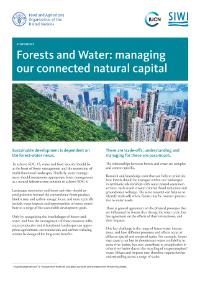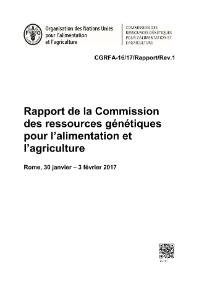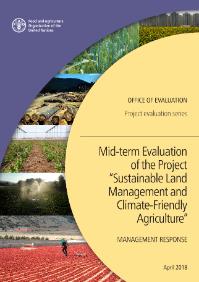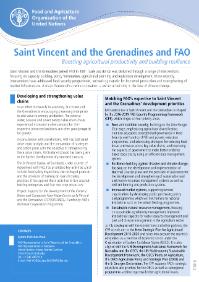Focal point
Location
The Food and Agriculture Organization of the United Nations leads international efforts to defeat hunger. Serving both developed and developing countries, FAO acts as a neutral forum where all nations meet as equals to negotiate agreements and debate policy. FAO is also a source of knowledge and information. We help developing countries and countries in transition modernize and improve agriculture, forestry and fisheries practices and ensure good nutrition for all. Since our founding in 1945, we have focused special attention on developing rural areas, home to 70 percent of the world's poor and hungry people.
Members:
Resources
Displaying 336 - 340 of 5074Forests and Water: managing our connected natural capital
The forest-water nexus is crucial for ensuring water and food security, as well as for achieving sustainable development objectives. Only by recognising the interlinkages of forests and water, and how the management of these resources influences productive multi-functional landscapes can appropriate long-term benefits from landscape planning and management be actualized. And while it is important that generalized assumptions about the forest-water nexus are not widely applied due to their complex and context specific nature, the knowledge is available to lend guidance.
Rapport de la Commission des ressources génétiques pour l’alimentation et l’agriculture - CGRFA-16/17/Rapport/Rev.1
Meeting Name: Commission on Genetic Resources for Food and Agriculture (CGRFA)
Meeting symbol/code: CGRFA-16/17/Rapport/Rev.1
Mid-term Evaluation of the Project “Sustainable Land Management and Climate-Friendly Agriculture” - Management Response
The “Sustainable Land Management and Climate-Friendly Agriculture” Project was implemented in Turkey to improve the sustainability of agricultural and forest land use in the area by rehabilitating degraded forests and rangelands, promoting climate-smart agriculture and establishing a favourable enabling environment. The project was designed to develop the necessary strategies, plans, tools and mechanisms that will aid stakeholders in sustainably managing forest and land resources.
Saint Vincent and the Grenadines and FAO
Saint Vincent and the Grenadines joined FAO in 1981. Early assistance was delivered through a range of interventions focusing on capacity building, policy formulation, agricultural planning and legislation development. More recently, interventions have addressed food security programmes, technology transfer for improved production and strengthening of market infrastructure. A major feature of current cooperation is resilience building in the face of climate change.
Fortalecer Las Políticas Sectoriales Para Mejorar Los Resultados En Materia De Seguridad Alimentaria Y Nutrición
La tierra, la pesca, los bosques y otros recursos naturales proporcionan una base para los medios de vida y las prácticas sociales, culturales y religiosas. Sin embargo, la mayoría de las personas en las zonas rurales de los países en desarrollo no tienen ningún tipo de documentación para proteger sus tierras y sus derechos a los recursos naturales, lo que pone en peligro sus medios de subsistencia y, en consecuencia, su seguridad alimentaria y nutricional.











